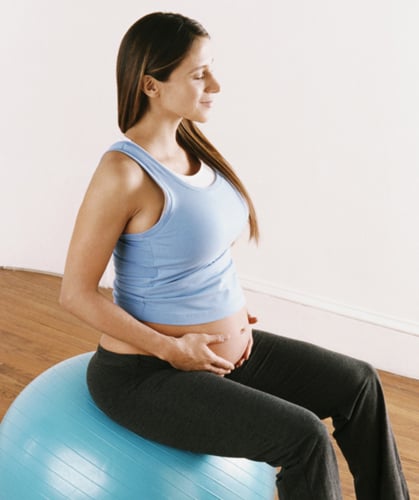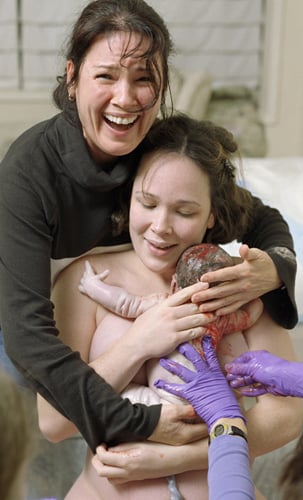Hospital birthing units Midwifery-led care
These are birthing centers staffed by midwives with minimal high-tech equipment, or use of epidurals.
There may be a
birthing center in your community. Some centers are free-standing but
often hospital based. Staffed by midwives for the most part, such
centers offer a caring homelike setting with minimal use of technology.
Since they are all affiliated with a medical center, transportation is
made if labor becomes complicated, if the mother requests an epidural,
or if she requires an assisted delivery or cesarean.
Getting the birth you want
Although there are no
guarantees that your labor will proceed in the way you would like it to
and it's probably best to approach labor with a flexible attitude, there
are things you can do to make it more likely that you will end up
having the type of experience you would prefer. Attending childbirth
classes and being as informed as possible about labor and your choices
will help you to prepare in advance. Other things women find helpful are
having a supportive birth partner, making decisions with the midwife,
being positive, and using a birth plan.
Communicating with your midwife helps to ensure that she is clear about your wishes and you work together.

A birthing ball provides support, but also means that you can be active by rotating your hips.

Hospital checklist What to check before going into hospital
Part of planning
for labor is finding out which facilities your local maternity unit
provides and what you might need to provide yourself to help you through
the labor and birth.
Check if your local unit supplies equipment such as birthing balls or TENS units or whether you need to rent these in advance.
Check in advance if the hospital has a birthing pool and midwives trained to deliver babies in water.
Find out if your hospital has a dedicated birthing unit.
NOTE
Visualize your dream
birth and work toward making this a reality—whether a home birth, or
creating a calm environment in your hospital birthing room
NOTE
What could be more natural to reduce stress during labor than a soak in a warm bath or even standing under a shower?
NOTE
While in the hospital, you may need to summon your assertive skills to ensure a safe environment for you and your baby
Home birth Planning a birth at home
Although only fewer
than one percent of women in the US choose to give birth in their own
home, this number is increasing. Research has shown that mothers may
have shorter and less painful labors in their own home. It is not known
why this is, although it may be due to them feeling more confident and
comfortable in their surroundings. You will generally have at least one
midwife with you constantly once you are in established labor during a
home birth. Many women rent a pool for use during labor at home, and
this may progress to a water birth.
| Q: |
Will I be allowed a home birth?
|
| A: |
If your pregnancy has been classified as “low risk”—you are
healthy and have not had any complications in this or any previous
pregnancies—then a home birth may be an option. If your doctor or
midwife isn't able to help you with a referral, you could find a
home-birth midwife in your community through Midwives Alliance of North
America (MANA).
|
| Q: |
How do I plan for a home birth?
|
| A: |
If your midwife is agreeable to the possibility of you having a
home delivery, you need to talk to her about the type of home birth you
want to have, for example do you want a water birth
or to use a birthing ball, and how do you plan to manage the pain? If
you would like a water birth, you will need to rent a birthing pool well
in advance. You may want to set up a special area in your home to have
your baby, which ideally should be near bathroom facilities. Plastic
sheeting and old sheets are advisable to protect your flooring, and
shower curtains make a good surface for giving birth. You will also need
a supply of plastic bags for waste.
|
| Q: |
What will happen?
|
| A: |
The midwife will meet with you once in your home prior to the
due date. She will want to assess the layout and preparations for the
birth. Many home birth practices have strict guidelines for travel time
and will want to meet your partner and family if possible. You must
agree to be transported to the hospital if your midwife feels it's
necessary. Some midwives like you to provide towels and plastic sheets.
You will not be able to have an epidural or a cesarean at home so
candidates are selected carefully.
|
| Q: |
What if there is a problem?
|
| A: |
If the midwives are at all concerned about you or your baby's
health, they will discuss this with you and it may be necessary to
transfer you to hospital. This transfer is usually done by ambulance,
accompanied by paramedics, your midwife, and your birth partner.
|
A home delivery:
Having your baby at home can
be a relaxed and intimate experience, giving you control over your
environment and allowing siblings to see the new baby right after the
birth.

Water births Relaxing in labor
Some cultures have used
water births for centuries to provide a gentle birthing experience.
Today, there is evidence to support the fact that labor may be quicker
and less painful in water.
| Q: |
How can it help with the pain?
|
| A: |
Possibly women feel more comfortable and therefore more
confident and in control in water. It is thought that water sets off a
surge of oxytocin (the hormone that triggers contractions), making
contractions more effective. Some women find they can move around more
easily in water, which helps them find a good position in which to give
birth. Some feel the benefits of immersion in warm water as soon as they
get into the pool, but for others it can take 15–30 minutes before they
relax. Water can be a natural aid to relaxation as it soothes muscles
and releases tension. When we feel less anxious, our bodies produce
fewer “stress” hormones. This encourages the brain to produce
endorphins, the body's painkillers, and promotes well-being. Dimmed
lights and relaxing music can further aid relaxation. Some studies
suggest that women have a shorter second stage of labor in water, and
there may be less exertion needed to push the baby out. Pain medication
is available to you if your are planning a water birth.
|
| Q: |
Can the baby be monitored in water?
|
| A: |
Your baby can still be monitored by the midwife using a stethoscope or a waterproof handheld electronic doppler.
|
Myths and misconceptions Is it true that…
| Q: |
Owls are bad luck?
|
| A: |
Owl superstitions are just plain silly!
If a pregnant woman hears the shriek of an owl, her child will be a
girl. An owl living in the attic of a house will cause a pregnant woman
to miscarry. When the time comes to give birth there should be no owls
in the delivery room—if they hoot at the moment of birth the child will
have a miserable life. These really are myths!
|
| Q: |
Raspberry leaf tea makes labor easier?
|
| A: |
The evidence for this is largely anecdotal, although some studies have been conducted.
Advocates of raspberry leaf tea claim it increases the muscle tone of
the uterus making for more effective contractions, and therefore a
shorter and easier labor. However, it's important not to use raspberry
leaf tea (or extract) until the last two months of pregnancy because of
the possible stimulating effect on the uterus.
|
| Q: |
Your partner weighed 10 lb at birth, so your baby will be a whopper, too?
|
| A: |
No, it's more complicated than that—it depends on the mix of chromosomes your baby inherits.
So, if the father is a strapping 6'4” and was a huge baby, and you're a
petite 5'2” and were a tiny baby, keep your fingers crossed that you
have the more dominant genes!
|